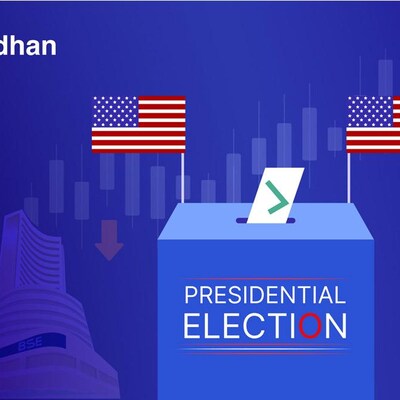The US presidential elections will have a major impact on global markets, including India’s bustling stock exchanges. With investors across the globe watching with anticipation, much of the focus is on their impact on India’s benchmark stock index, the Sensex.
Historically, US election results have sent ripples through the international economy. In this article, we provide insights into what the Indian markets should expect from the US Presidential elections, highlighting the outcome and what it means for investors.
Historic impact of US elections on Indian stock market
Indian equity markets have shown mixed reactions to the US presidential elections, reflecting broader global market sentiment which has been influenced by political changes in the US.
- 2008 US Presidential Election (Obama wins): The 2008 election coincided with the global financial crisis, making it difficult to separate the direct impact of the election result from the wider economic turmoil that led to the Sensex falling by around 9.92%. However, Indian markets, influenced by positive sentiment towards his economic stimulus measures, ultimately mirrored the global recovery.
- 2012 US Presidential Election (Obama re-elected): This was received positively in the Indian market, with the BSE Sensex index rising around 0.58 per cent in line with global markets, reflecting the continuity of US policies which are seen as favourable for global trade and the economy.
- 2016 US Presidential Election (Trump wins): The immediate reaction to Donald Trump’s victory was a sell-off in Indian markets, with the Sensex falling by around 1.75% the day after the election. This reaction was part of a global trend driven by uncertainty over Trump’s trade and foreign policy. However, markets stabilised and recovered in the following month.
- 2020 US Presidential Election (Biden wins): This was well received, with the Sensex index rising 2% in the week following the election announcement, as markets reacted favourably to expected stability in trade policy and international relations.
Historical data suggests that while the US presidential elections will create immediate volatility in the Indian equity market, the resilience of the Indian market, while highly dependent on its home economic fundamentals, demonstrates its ability to adapt to global political changes.
Why do US elections impact Indian stock markets?
Here are some key factors that will impact the Indian stock market significantly due to the US elections:
1. Economic Policy
The new government’s policies will determine agreements, tariffs and outsourcing regulations that will directly impact sectors such as pharmaceuticals and IT.
These policies will affect the extent to which Indian companies do business with US companies and, in turn, how investors view Indian companies.
2. Geopolitical stability
Political stability in the United States will affect confidence in global markets. Changes and uncertainties following the US elections may cause fluctuations in commodity prices and overall market stability.
These changes will impact the decisions of investors across the world, including those who invest in Indian stock markets like the Sensex.
For example, the dispute between the United States and China over a trade deal has had a lasting impact on global markets.
3. Global investor sentiment
The US elections are likely to have a major impact on investor perceptions of risk in global markets, including India.
If investors believe the new US administration will implement pro-India policies, they may increase exposure to Indian stocks. But if there is uncertainty or concern, investors may pull out, sending prices tumbling.
4. Sectoral impacts
Various sectors in India, such as technology and pharmaceuticals, are uniquely affected by the US election outcome.
For example, technology policies proposed by US candidates could affect the revenue and growth prospects of Indian IT companies. Similarly, changes in US healthcare policies will impact Indian pharmaceutical companies.
5. Currency Movements
A change in the outcome of the US election could trigger a shift in the global currency markets. If the US dollar strengthens against the Indian rupee, it could increase the cost of importing raw materials for Indian companies, impacting their profits.
Meanwhile, a weaker dollar could lower import costs for Indian companies and boost profits.
6. Trade relations and regulations
New trade policies and tariffs imposed by the new US administration are likely to impact sectors such as pharmaceuticals and IT services in India.
Changes in intellectual property rights protections could also impact how Indian companies do business with the United States.
Conclusion
The historic impact of the US presidential elections on Indian stock markets highlights the intricate link between global political events and local economic outcomes.
Over the years, stock market reactions have ranged from sharp declines to gradual recoveries, reflecting the nuances in each election outcome and the policies that followed.To track market indices such as the Nifty 50 and the BSE Sensex, use an online trading platform such as Dhan.

